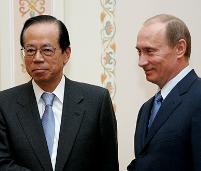Japanese Prime Minister Yasuo Fukuda met with outgoing Russian President Vladimir Putin and his successor, Dmitry Medvedev, outside Moscow this past weekend. The talks addressed preparations for this July's Group of Eight summit, which Japan is hosting, as well as such perennial issues as how to improve the often strained security and economic relations between the two countries. Tokyo-Moscow ties have remained troubled for decades. This weekend's Moscow summit failed to change the underlying causes of these difficulties. Despite the end of the Cold War, the two countries have been unable to resolve their territorial dispute over what the Russians call the Southern Kurils and the Japanese label their Northern Territories. These four islands -- Kunashir (known in Japanese as Kunashiri), Iturup (Etorofu), Shikotan and Habomai -- have remained under Moscow's control since the Soviet military occupied them at the end of World War II. The Soviet authorities expelled the original inhabitants and established military bases and other settlements in their place. Japanese government representatives have claimed that, while Tokyo did cede control of the Sakhalin and Kuril islands to the USSR under the 1951 San Francisco Peace Treaty, which Moscow never signed, the treaty's provisions did not apply to the four islands of the Northern Territories, which Tokyo has never recognized as part of the Kuril chain. A 1956 Joint Declaration restored diplomatic and commercial relations between Russia and Japan, but the lingering sovereignty dispute has prevented their signing a formal peace treaty.
Japan-Russia Summit Fails to Resolve Longstanding Territorial Dispute

